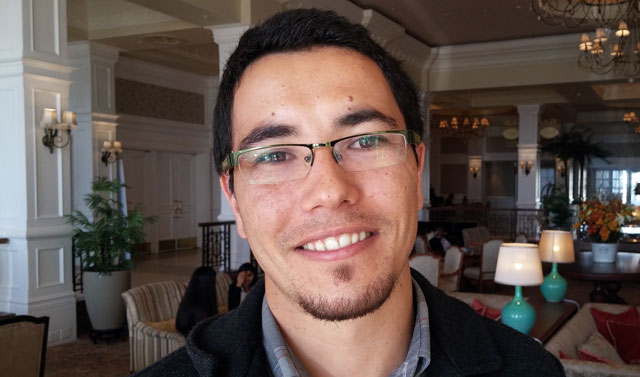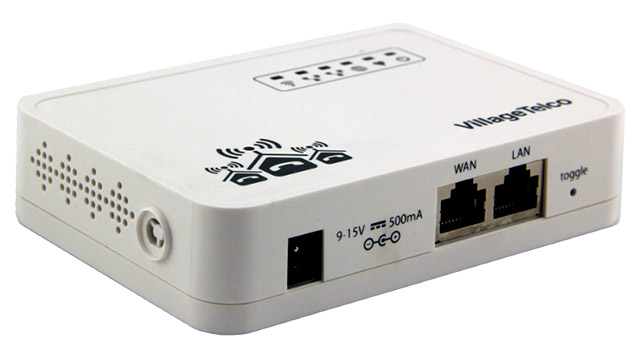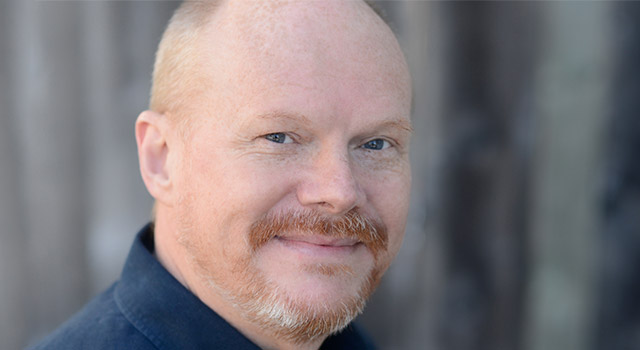
The University of the Western Cape has introduced a new model for Village Telco’s Mesh Potato telecommunications device that promises to make the technology sustainable in the long term in rural communities.
Village Telco was incorporated by Steve Song in 2011 during a three-year stint as a fellow of the Shuttleworth Foundation. The idea was to build low-cost community telephone network hardware and software that could be set up in minutes. The result, the Mesh Potato, uses the latest open-source telephony software and no mobile phone towers or land lines are required. Using small access point hardware, Mesh Potatos are linked together to create a mesh network that can be used for both data and voice calls in rural communities. For voice telephony, an analogue phone can be connected to the Mesh Potato, or a Wi-Fi-enabled cellphone can be used to make voice-over-Internet protocol (VoIP) calls.
“What’s new with the second generation technology of Mesh Potato is the significant improvement in the hardware and cost of the device,” Song tells TechCentral. “A barrier to the uptake of the original device was its price point of US$120. Because you have to deploy a number of these devices in a single network, costs can add up fairly quickly.”
The basic edition of the new generation Mesh Potato was launched a month ago and retails for $39. The new device includes a new-generation Wi-Fi chipset, which supports 802.11n, resulting in faster access speeds. It also has more memory and a faster processor.
But the most important new features are the two Ethernet ports and a USB port that allow users to add a 3G dongle or plug in a flash drive.
Song says the printed circuit board on the new generation hardware also has all the general purpose input/output pins exposed so that people can connect other hardware directly to it, ultimately allowing hardware such as the Arduino open-source electronics platform to be connected.

Since it was launched, the Mesh Potato has been deployed many times on a small scale, but Song says a mesh network of 25 to 100 nodes is the sweet spot.
A senior researcher from the University of the Western Cape, Carlos Rey-Moreno, has developed an interesting business model around the technology. His model is based on South African co-operative legislation, which is traditionally aimed at farmers to leverage their collective interests, but which is now being applied to telecoms.
“It opens up very interesting possibilities, and I think this is an opportunity for the regulator, Icasa, to acknowledge these new forms of telecommunication organisations that can self-deploy,” says Song.
The early deployment models for the Mesh Potato fell into one of two categories. There were philanthropic funders who would pay for their networks, but this is not a sustainable model in the long term, says Song. Then there were businesses such as wireless Internet service providers and VoIP providers who saw the Mesh Potato as a commercial product.
Rey-Moreno’s project introduces a new and more sustainable model for building locally owned voice and data infrastructure.
“We are using the technology to study the feasibility of rural communities in South Africa to create their own telecoms operators to reduce the cost of communication. Our study is taking place in the Eastern Cape community of Mankosi, and for this project we are using the Mesh Potato and Village Telco as a platform,” explains Rey-Moreno.

The project, which began in 2012, has involved training members of the Mankosi community in how to deploy a mesh network, giving them the capability to make calls and have access to the Internet at a fraction of the cost they were paying previously. From there on, the business model is developed by the community, says Ray-Moreno. Initial set-up costs of about R90 000 were covered by the University of the Western Cape.
Song says one of the weaknesses of other Village Telco deployments has been a lack of support or a business back-end to allow communities to turn the devices into a sustainable businesses, something that the University of the Western Cape has been able to solve in Mankosi. Ray-Moreno is implementing a billing system that will allow communities to collect revenue for voice calls. — © 2014 NewsCentral Media




